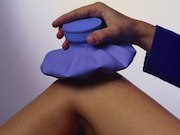It's a busy Tuesday morning and I'm eating breakfast with my family. Four of us sit around the table tucking into Vegemite toast. But since I am throwing myself (and my family) into an experiment, we are all eating our toast with chopsticks.
My kids (aged seven and eight) happily hoe into their brekkie, chattering away as they navigate the toast from plate to mouth with their novelty utensils. They take it all in their stride. Meanwhile, I'm starving – I never did get the hang of chopsticks.
“It might be easier than you think to make it feel new.”
While we often eat breakfast as a family, today the mood around the table is positively joyful. It feels like we are all playing a game together and it's a lovely way to begin the day.
My kids aren't bickering, my husband's not fretting about getting to work and I'm concentrating so hard on getting food into my mouth that I don't think twice about my dreaded "to do" list.
I'm inflicting this experiment on my family after reading research in Personality and Social Psychology Bulletin that claims doing things in an unconventional way makes everyday experiences feel fresh.
American researchers conducted tests in which participants ate popcorn (with chopsticks!), drank water and watched a video in novel ways. Co-author Robert Smith, of Ohio State University, says that finding new ways to do the same everyday things can stop people getting bored and, in turn, increase their enjoyment.
In an interview for the OSU website, Smith notes that the effect comes from creating a first-time perspective. The theory is that the first time you experience something (it could be an object, a type of food, an activity), you pay more attention to it. As you experience it again and again, you pay less attention until you become bored. But finding a new way to experience it can bring back your original feelings.
Smith believes the theory could explain the popularity of pitch-black restaurants that serve diners in the dark. "It may not be anything special about darkness that makes us enjoy food more," he says. "It may be the mere fact that dining in the dark is unusual."
The idea could have other benefits. Instead of buying new furniture, for example, he suggests moving your old, familiar pieces around. "It might be easier than you think to make it feel new," he says. "It is also a lot less wasteful to find new ways to enjoy the things we have, rather than buying new things."
Another big benefit is that it helps you break out of your routine. As well as making my family eat breakfast with chopsticks, I tested the theory by wearing fancy dress (a tutu and bunny ears) to my group exercise class. Yes, I did get a few funny looks, but the silly outfit allowed me to laugh at myself. Even burpees were more fun (honestly).
In a less embarrassing experiment, I discovered new routes to take on the school run. As I walked along unfamiliar streets, I found myself feeling a profound sense of presence. I asked psychologist Jocelyn Brewer to explain why
"When we do something differently, we use a range of new neural pathways and have to place more conscious attention on the activity, make choices and think about what comes next in a sequence; for instance, driving a new way home," she tells me. "This can help us be more mindful and present, which might mean we notice more about our environment."
Of course, there is nothing wrong with doing some things on autopilot. In fact, being able to do some day-to-day activities without thinking about them means that you can use your brain to concentrate on the bigger picture. And, as Brewer notes, it's not like every day can bring an amazing new adventure.
On the other hand, being a little unconventional can introduce new joy to the daily grind. You might get some funny looks from your friends and family, but if it makes you happy, it's worth it.
This article appears in Sunday Life magazine within the Sun-Herald and the Sunday Age on sale September 23.
Source: Read Full Article






